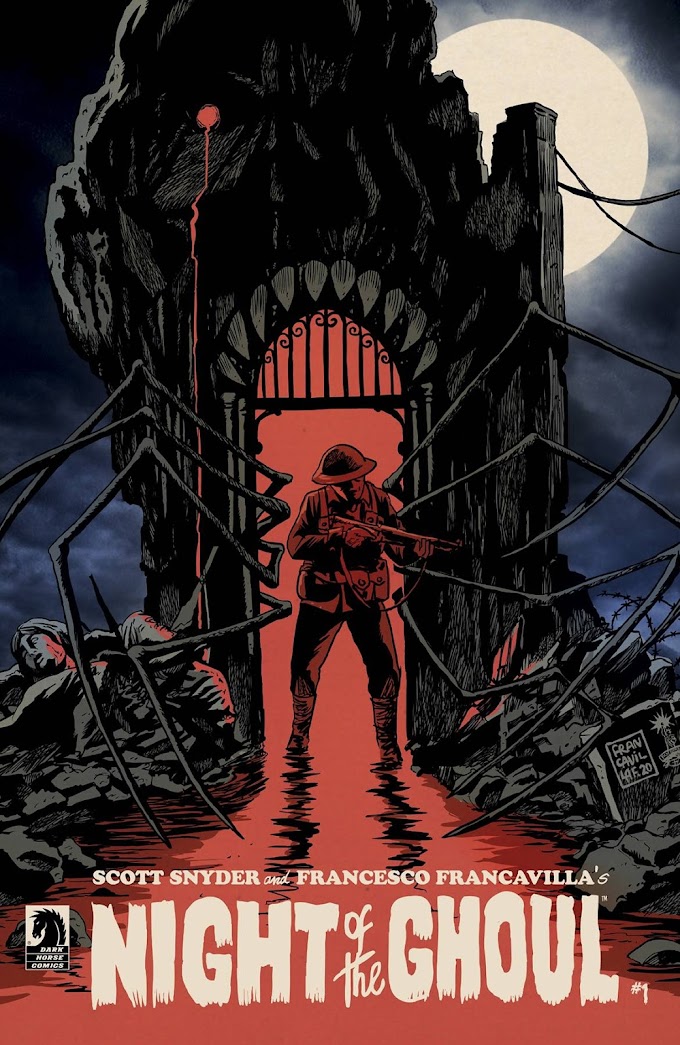Jeff Lemire’s Sweet Tooth first came out in 2009 and lasted for about 4 years. Its central premise is that people started getting sick nine years ago and dying from a mysterious illness. At least, that’s what was happening in North America; Lemire doesn’t really address what was happening in the rest of the world. But as humanity was dying, another phenomenon was occurring at the same time; children with animalistic qualities were being born. Boys with antlers and girls with pig noses were birthed into existence, cruel and unnatural defects that had to have shared some connection with all of the death.
Gus, the boy with the antlers, was raised in a secluded cabin by his father, sheltered from the rest of the world. Like any kid, Gus wondered what the world is like beyond the reaches of his woods but his father warned him not to go out that far. Trying to protect Gus from whatever is out in the world, the two live in pastoral isolation until Gus’s father gets sick and passes away. Left alone, Gus is found by a surrogate father, Jepperd, and promised to be taken to a reserve that shelters children like him. But Jepperd betrays Gus’s trust, turns him over to militants and scientists who believe that children like Gus are key to curing the disease that is killing everyone. This begins Gus’s somewhat violent journey to discover the truth of what he is and what role he has in the future of civilization.
You know, your usual post-apocalyptic, coming-of-age story. It’s like Cormac McCarthy’s The Road meets Stephen King’s Stand By Me.
When it was first published in 2009, the idea of a disease that affects the entire world seemed like a fantasy but now it is fascinating to see how Lemire posits it would fundamentally change the world, mostly by bringing a new Adam into it. Lemire imagines a creation myth for a new breed of humanity, where Gus is the new first man, created in the image of an unknowing god. But the difference between the original Adam, who was the cause of the fall of Eden, and Gus is that Gus was born into an already fallen world.
Lemire’s unique linework carries the spiritual burden of this comic. As always, his depictions of characters come more from a personal and emotional core than a physical representation of who these people are. His linework shows an inner quality of the characters. From Gus’s innocence to Signh’s tenuous grip on reality to Jepperd’s determination to protect the children, Lemire draws a more personal portrait of his characters. Just through the way he draws, you experience the state of these characters, their determination, their madness, and their innocence. That has always been the attraction of Lemire’s work. And even as he simplified his art a bit to fit the original monthly production schedule, his drawings are mesmerizing for their expressiveness and rawness.
Largely a boy’s story, this book is the type of adventure story that is reserved for a child’s rite of passage. As Gus is pulled into this journey, he slowly develops a community around him, beginning with a small group of children like him and a few men and women cast off by whatever remains of civilization. Sweet Tooth is almost as much of Jepperd’s story as it is Gus’s. Jepperd begins as a broken and opportunistic man, lost after the death of his wife and unborn son. Lemire’s story for Jepperd shows a man who lost everything but who does find something to keep living for. But the narrative keeps coming back to Gus and how he is the future. Jepperd is there to help see that future come to be.
With Gus and Jepperd at the center of this story, the rest of the cast circles these two, providing testimony for what the world was, what it currently is, and what it could be. The hybrid children are either the future or abominations, depending on how strongly you judge your own humanity. The men and women who follow Gus represent the transition that humanity experienced, showing everything good and bad about our humanity that was passing on for whatever came next. Through this cast, we see evidence of the best and the worst of people.
Sweet Tooth continually looks for worthiness in mankind, trying to judge if it is all worth it or not. Lemire guides this story in a way that shows us mankind at its best and its worst, guiding us to pass some kind of judgment on it even as Lemire works toward his own final verdict. So this story of a pandemic that decides the fate of mankind feels somewhat prophetic in retrospect to everything we’ve gone through these past few years.
Jeff Lemire’s Sweet Tooth shows us a world on the verge of becoming something new and different. In this transitory state, he shows us death and birth, suggesting a cycle and a time for all things. Gus is this turning point for the world, making his story ultimately a celebration and an accusation of everything we are and can be. It’s the story of a father wanting this to be a world for his children to grow up in and for it to be their world. For Sweet Tooth, it just takes an apocalyptic extreme for that passing of generations to happen.
Sweet Tooth Compendium
Written and drawn by Jeff Lemire
Colored by Jose Villarrubia
Lettered by Pat Brosseau and Carlos M. Mangual
Additional Artwork by Matt Kindt, Nate Powell, and Emi Lenox
Published by DC Comics










![Sweat and Soap [Ase to Sekken] by Kintetsu Yamada](https://blogger.googleusercontent.com/img/b/R29vZ2xl/AVvXsEgMnQltxjWqGS1_duhCp9Er1a0NbALuSFrqvjaV4_PjN_w67xCGghYt-l0qKyqTH7Ei7gbq_mxVq8aPAuOiyaArwAMLJWhpGmOYaARUBnwvjmv2-ZIe20m_zR5CvKnPdI6US_AuOnmi3gSX/w680/57525895-BA7E-4EF8-9FE4-89F9C164E1A4.jpeg)

